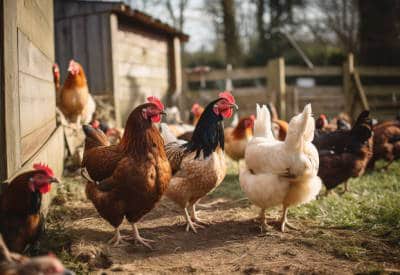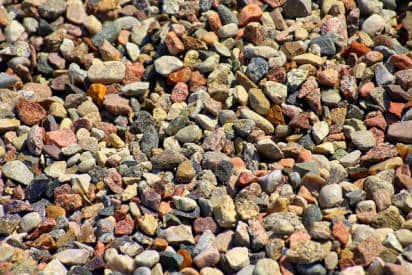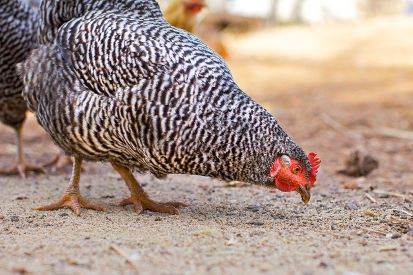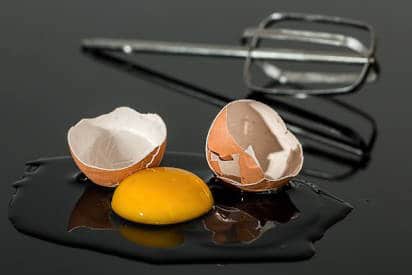There’s something uniquely charming about the clucking of chickens and their constant pecking and scratching in the yard. As a long-time chicken enthusiast, I’ve come to appreciate their quirks, personalities, and even peculiar dietary habits. Today, we’re tackling the curious question: do chickens eat rocks?
In a nutshell, while chickens don’t exactly snack on the gravel in your driveway, they consume something known as ‘grit,’ which comprises tiny rocks or pebbles. These little bits of stone are crucial in their digestion process, acting as the chickens’ surrogate teeth to grind down food in their gizzard. So, in a way, it’s accurate to say that chickens do eat certain types of small rocks!
In this comprehensive guide, we’ll dive into the nuances of a chicken’s diet, the all-important role of grit, and how you, as a chicken owner, can ensure your feathered friends are getting the right balance. Whether you’re a seasoned chicken farmer or a newbie in the poultry world, this information is vital to keeping your flock healthy and happy.
Understanding the Chickens’ Digestive System
Let’s kick things off by diving deep into the fascinating world of a chicken’s digestive system. When you look at chickens pecking away in the yard, it’s easy to wonder how those hard grains and other stuff they eat get processed in their bodies. The magic, my friends, largely happens in the gizzard.
Overview of a Chicken’s Digestive System
The journey of digestion begins as the chicken pecks and swallows food, which then enters the crop – a sort of storage bag in their necks. From there, it’s onward to the stomach, divided into two parts: the proventriculus (where food gets a good dose of acid and enzymes) and the gizzard.
Role of the Gizzard in Digestion
The gizzard is like nature’s blender. It’s a muscular part of the stomach that grinds down food. But here’s the catch – it needs a little help to do its job well. And that’s where grit comes into the picture.
The Use of Grit in a Chicken’s Digestive Process
Think of grit as the teeth in the gizzard’s grinding operation. Chickens don’t have teeth, so they eat small rocks, known as grit, which stay in the gizzard to help break down larger food particles. Without grit, chickens might not get all the nutrients they need from their food.
[ChickenAffiliate]
The Concept of Chickens Eating Rocks: Dispelling the Myth
Here comes the fun part – do chickens really eat rocks? Not quite. It’s more accurate to say that chickens eat grit, not just any random pebble they stumble upon.
The Real Story: Chickens and Grit
Grit is a specific type of small rock or pebble that chickens deliberately seek out and swallow. It comes in different sizes and is not quite the same as the stones in your driveway.
Distinguishing between Rocks and Grit
Grit can be made of insoluble materials like small pebbles, coarse sand, or crushed seashells. These materials are hard enough to help the gizzard break down food yet small and safe enough not to cause harm to the chicken.
The Essential Need for Grit in a Chicken’s Diet
Simply put, a chicken’s diet without grit is like a mill without a grindstone – it just won’t work properly. Grit is essential for effective digestion in chickens, especially those with a diet heavy in whole grains or forage for insects and greenery.
The Importance of Grit in a Chicken’s Diet
Okay, by now, you’ve probably gathered that grit is pretty important for our feathered friends. But what are the specifics, you ask? Let’s explore.
Types of Grit: Insoluble and Soluble
Insoluble grit, like small pebbles, stays in the gizzard for grinding purposes. Soluble grit, on the other hand, dissolves over time, providing chickens with necessary minerals. An example of soluble grit is crushed oyster shells, which provide calcium for strong eggshells.
Benefits of Grit to Chickens
Grit aids in digestion, but it also plays other roles. It helps chickens get more nutrients from their food, leading to healthier, happier birds. And remember, for the ladies, that soluble grit helps produce eggs with strong, healthy shells.
Recognizing a Grit Deficiency in Chickens
You might notice decreased egg production, thinner eggshells, or generally lethargic birds if your chickens are low on grit. Their droppings might also look different, indicating they’re not digesting their food properly.
How to Provide Grit to Chickens
So, how do you ensure your chickens are getting enough grit? Good question. Let’s figure that out together.
Sourcing Quality Grit for Chickens
You can buy commercial chicken grit from a farm supply store or online. This is often made from crushed granite or oyster shells. If you want to go the natural route, coarse sand or tiny pebbles can work too.
Determining the Appropriate Quantity of Grit
While chickens are pretty good at figuring out how much grit they need, a general rule is to provide a free-choice grit station where they can pick up what they need. A small bowl should do the trick for a backyard flock of about a dozen birds.
Incorporating Grit into a Chicken’s Diet
There’s no one-size-fits-all answer here, as it depends on the chicken’s age and diet. Young chicks need finer grit, while layers need access to calcium-rich grit. Remember to make grit available consistently, especially if your chickens are eating a lot of whole grains or foraging.
Frequently Asked Questions about Chickens and Rocks
It’s time to address some of the most burning questions you might still have about chickens and their rocky diet.
Why do Chickens Peck at the Ground?
Chickens peck at the ground for various reasons – they might be after tasty bugs, fresh greenery, seeds, and sometimes they’re looking for grit.
Can Chickens Digest Actual Rocks?
Big rocks? No way. Chickens can’t digest larger stones; if they somehow swallow one, it can cause serious health problems.
What Happens if Chickens Don’t Get Enough Grit?
Without enough grit, chickens won’t be able to digest their food properly, which can lead to malnutrition and other health issues.
What Unusual Foods Can Chickens Eat?
Chickens are known to be quite the adventurous eaters, pecking and scratching at just about anything that piques their interest. But what about some more unusual items like egg shells, coffee grounds, or crab shells? In this section, we’ll explore five less conventional ‘foods’ and explore whether they’re beneficial or potentially harmful for our clucking companions.
Egg Shells
You might think it’s cannibalistic, but chickens can eat their eggshells. They’re a great source of calcium, which is essential for laying hens to produce strong eggshells. Just clean and dry the shells, then crush them before offering them back to your hens. This helps to prevent them from developing a taste for their own fresh eggs.
Read More: Can Chickens Eat Egg Shells? Unscrambling The Truth
Coffee Grounds
Despite their popularity among gardeners as compost, coffee grounds aren’t so beneficial for chickens. They contain caffeine and other substances that can be harmful to birds. While a tiny bit won’t likely harm your chickens, keeping your coffee grounds out of the chicken run and in the compost bin where they belong is best.
Read More: Can Chickens Eat Coffee Grounds? The Surprising Truth Revealed
Moldy Food
Chickens aren’t picky eaters, but moldy food is a big no-no. It can contain mycotoxins that are harmful to chickens, causing a range of health issues, from digestive problems to serious diseases. Always ensure your food is fresh and safe for your flock to eat.
Read More: Can Chickens Eat Moldy Food? Uncovering Facts You Need To Know
Diatomaceous Earth
While not a food source, diatomaceous earth (DE) can benefit chickens in several ways. It’s a natural substance made from crushed fossils that can be sprinkled in dust baths to help chickens rid themselves of mites and other parasites. However, chickens shouldn’t be encouraged to eat DE as it provides no nutritional benefit and could harm their respiratory systems if inhaled in large amounts.
Read More: Can Chickens Eat Diatomaceous Earth? Uncovering The Truth
Crab Shells
Believe it or not, crab shells can be quite good for chickens. They are a fantastic source of calcium and protein. If you have any leftovers from a seafood feast, consider drying them out, crushing them, and offering them to your chickens. Just be sure to remove any sharp edges to prevent injury.
Read More: Can Chickens Eat Crab Shells? Simple Answer & Feeding Tips
Do chickens eat rocks – final thoughts
We’ve pecked our way through the gritty truth about chickens’ dietary habits, haven’t we? These intriguing creatures don’t chow down on just any old rocks they find, but rather, they strategically consume ‘grit’ – tiny, hard bits that help them grind down their food and extract maximum nutrients. Without grit, our feathered friends would be in a peck of trouble when it comes to digesting their meals.
So, the next time someone asks you, do chickens eat rocks? you can confidently set them straight with your newfound knowledge. Chickens are the rock stars of the animal kingdom, as they cleverly use grit to make the most of their diet. We’ve learned that providing chickens with the right grit can lead to healthier flocks and better egg production. Who knew such tiny stones could have such a significant impact?
Related Articles:





